Andrew Fairlie's 25 Years of Roux
POSTED ON 28/09/2009No blog last week, I’m afraid. My computer expired or rather the back light went, which meant a new computer and retrieving files and folders that hadn’t been backed up. A new machine was long overdue as the old one was playing havoc with my patience, always slow, constantly sticking and generally leading me a merry dance. Having a new computer (a desktop iMac since you ask) feels like moving to a beautiful new house from a cramped flat, only with lots of boxes stacked in heaps on the floor, and forays back to the old flat to search in the dark for the missing files and folders that weren’t backed up. I’m getting there. Any suggestions for a small, light laptop /netbook for tasting notes and travel welcome.
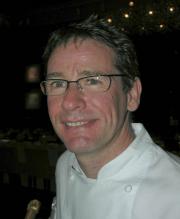 Andrew Fairlie
Andrew Fairlie
Now where was I? Oh yes, in Scotland with Andrew Fairlie at his two-Michelin star restaurant (Scotland’s only one) Gleneagles. Not for the golf, which is of course what most people find themselves at Gleneagles for. But for a dinner Andrew Fairlie had decided to put on to celebrate 25 years of winning the Roux Scholarship which launched his career after giving him the opportunity to train with Michel Guérard at Les Prés d’Eugénie in Gascony. Not surprisingly then, Michel Roux from Le Manoir aux Quat’ Saisons was among Andrew’s friends present, as was his brother Albert and Michel Roux, Albert’s son, who now runs Le Gavroche, and The Independent’s former food correspondent, Joanna Blythman.
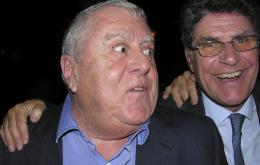 Albert Roux and Rémi Krug
Albert Roux and Rémi Krug
As if that weren’t special enough, Andrew had decided to make it a Krug dinner, matching different Krug champagnes with all but one of the courses, so the indefatigable Rémi Krug was on hand of course to give the lowdown on the Krugs. The menu itself was contained in a book of photographs of a trip Andrew had made to Krug. It was deceptively simple, seven courses, each a bare word, the main ingredient, its seasoning, its origin, followed by the wine to be drunk with that course. For the flavour of the dinner, it was as follows:
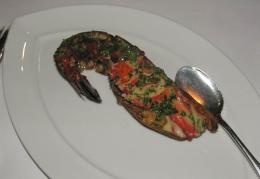 Scrabster Lobster
Scrabster Lobster
Crab – Seaweed – Stromness – Krug Grande Cuvée Scallop – Yuzu – Dunvegan – Krug Grande Cuvée Lobster – Herbs – Scrabster – 1998 Krug Clos du Mesnil Cep – Sweetbread – Methven – 1995 Krug Clos d’Ambonnay Grouse – Damson – Dunmaglass – 1982 Château Cheval Blanc Comté – Franche-Comté – 1982 Krug Collection Bramble – Auchterarder – MV Krug Rosé Note: MV not NV stands for multi-vintage, a Krug trademark
Deceptively simple on paper only because the execution (Andrew admitted before cooking the meal that he was nervous, hardly surprising with the Roux dynasty there) was demanding. The crab was a three layer affair with a rich, savoury crab mousse topped by a gelée of flaky crabmeat and crème fraiche which had a delicate shizo-like flavour. The scallop looked simpler, but apart from the freshness and tender juiciness of the sweet meat itself, there was a zesty, lemony bite to the yuzu. Both dishes were served with Krug Grande Cuvée, whose combination of toasty richness and elegant acidity worked well.
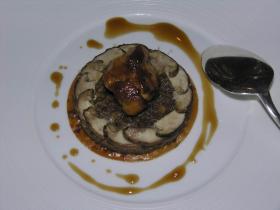 Cep
Cep
Andrew Fairlie’s lobster, from the onomatopaeic Scrabster, was also sweet to the taste, and smoky too, the main herb in question being tarragon. It was powerfully flavoured and so needed a wine partner that was both expressive and elegant. It almost overpowered the delicacy of the 1998 Krug Clos du Mesnil, which had just enough stuffing with its evolved honeyed notes and extra mineral dry character, to cope. With a tart of sliced cep topped with rich sweetbread came the 1995 Clos d’Ambonnay. It was amazing to be given the opportunity to try this wine, which has had a considerable amount of publicity since its release at £2,000 a bottle. Astonishingly, it lived up to its exalted reputation, a fabulously intense and winey blanc de noirs champagne from the Montagne de Reims, with its red berry fruit and toasty, grilled nut and ginger spice elements all marrying beautifully together.
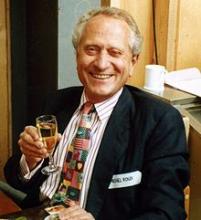 Michel Roux snr.
Michel Roux snr.
To serve 1982 Château Cheval Blanc with the tender, pink, very gamey grouse was a civilised way of killing us with kindness. Although 27 years old, the claret was fresh and cedary with a lush cherryish, slightly herbal quality from its large proportion of cabernet franc presumably, testimony to the sort of refreshing, moderate-alcohol great claret of yesteryear. Where are they now? Needless to say it went perfectly with the grouse, which was followed by the only non-Scottish ingredients in the meal, a nutty Comté cheese and a sprightly, truffley-spicy 1982 Krug Collection, whose nutty finish matched the Comté neatly. A dark chocolate cup which melted as a hot chocolate sauce poured over it revealed a chocolate brownie and fresh blackberries picked off the golf course that day by Andrew was a fine piece of theatre. Trying to partner a Krug Rosé with it was another matter, a stern test that didn’t quite come off. Did anyone care or notice by that stage? If they did, by the time they’d downed a dram of the Ardbeg Corryvreckan, there wasn’t a careworn brow in the room.
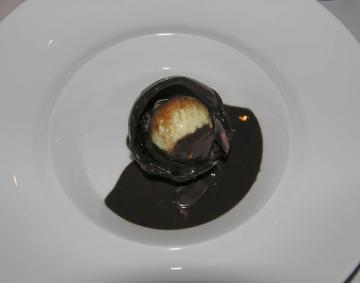 Bramble to finish
Bramble to finish

